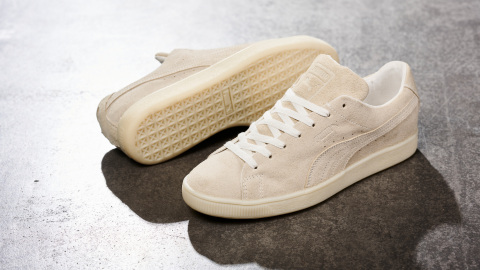No Time for Waste: PUMA pilots testing for biodegradable RE:SUEDE version of its most iconic sneaker
PUMA has initiated the RE:SUEDE experiment to develop a biodegradable version of its iconic sneaker, the SUEDE. Utilizing sustainable materials like Zeology tanned suede and biodegradable TPE, this pilot program aims to enhance circularity in footwear. Scheduled to launch in January 2022 with 500 participants in Germany, the project will assess the durability of these sneakers over six months before undergoing industrial biodegradation in the Netherlands. PUMA seeks to innovate waste management solutions, contributing to its sustainability strategy, which targets a 75% increase in recycled polyester by 2025.
- Launch of RE:SUEDE experiment targeting biodegradable footwear.
- Use of sustainable materials such as Zeology tanned suede and biodegradable TPE.
- Collaboration with Ortessa to enhance waste management solutions.
- Aligns with PUMA's sustainability strategy aiming for 75% recycled polyester by 2025.
- Previous biodegradable sneaker attempts failed due to low demand.
- The need for further research and development was highlighted in past initiatives.
HERZOGENAURACH,

No Time for Waste:
The RE:SUEDE experiment is a pilot in circularity, and today’s ultimate expression of the next generation SUEDE – with the ambition to set new standards of sustainability for the iconic shoe. Designed to help address the challenge of waste management in the footwear industry, the RE:SUEDE experiment will allow
In partnership with
The RE:SUEDE experiment is the first circular programme to launch under PUMA’s “Circular Lab” – a new innovation hub, which is led by PUMA’s sustainability and design experts who work to develop the future of the company’s circularity programmes.
This pilot is a recharged, refreshed experiment in circularity, following PUMA’s exploration in the space in 2012, which saw the brand’s first attempt to create a biodegradable sneaker as part of its InCycle collection. Yet after four seasons, the sneaker was discontinued due to low demand and the need for further research and development.
Since 2012, PUMA’s innovation department has worked to address the technological limitations of the InCycle collection in order to apply such learnings into the RE:SUEDE experiment. Improvements include the use of new, innovative materials such as Zeology suede, which is made using a more sustainable tanning process and ensures better comfort for the wearer, when compared to other biodegradable materials evaluated at
“In 2012, our circular ambition was bold but the technology wasn’t quite there. As they say, with every challenge there’s an opportunity - and we’ve continued to push ourselves to do better by applying our strengths as well as acknowledging and improving on our weaknesses,” said
About the partnership with Ortessa, Desens further comments: “We’re excited to partner with the experts at Ortessa, who share our passion in developing proactive and pragmatic solutions to the industry‘s waste problem. Their expertise is fundamental in helping us learn more about the after life of the RE:SUEDE, so we can continue moving forwards on our exploration of circularity.“
Rob Meulendijks, CEO of Ortessa comments: “As a family owned challenger in the waste industry, we pride ourselves in creating surprising innovations and fresh concepts to tackle real waste issues in a different and open way. There is a lot more we can all be doing to help tackle waste management, but taking on that challenge alone can be a difficult task for any brand. We are delighted to be working in partnership with
Since its first iteration in 1968, the
View source version on businesswire.com: https://www.businesswire.com/news/home/20211104005105/en/
Media:
Matanje Schepers – Corporate Communications –
Source:
FAQ
What is the RE:SUEDE experiment by PUMA?
When will the RE:SUEDE pilot launch?
How many participants will be involved in the RE:SUEDE experiment?
What materials are being used in the RE:SUEDE sneaker?
What is PUMA's sustainability goal for 2025?







